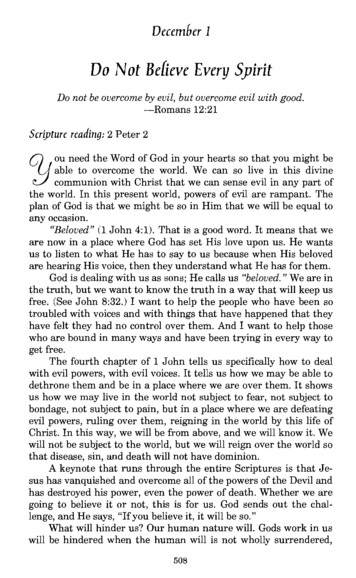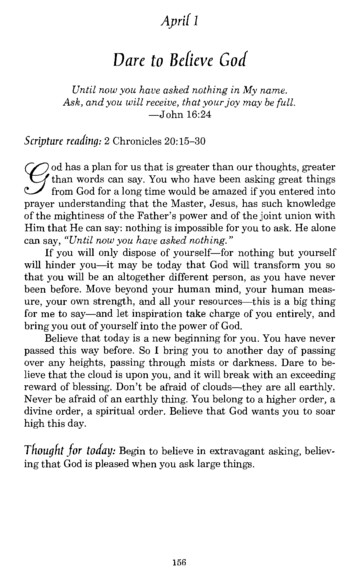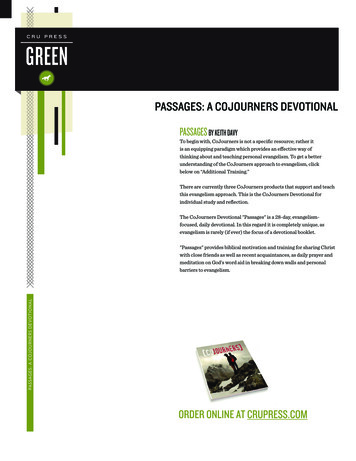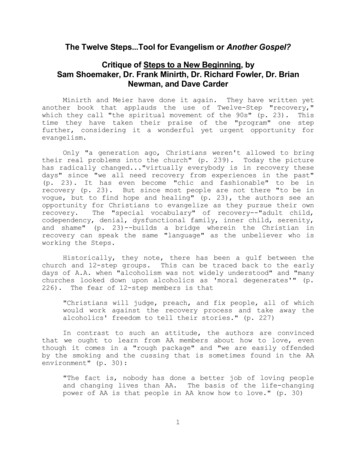
Transcription
Acts EvangelismTaG kito ood ngth N the w ew eor sld30 Day DevotionalBy Chris Losey1
2
Welcome to Acts EvangelismThe book of Acts is known as the Acts of the Apostles, but it might better becalled the Acts of Peter and Paul since it primarily focuses on theirministries. But more importantly, it is a book that shows how the earlychurch grew rapidly and expanded across the ancient world. It is filled withprinciples on evangelism that give the present-day Christian a clear view ofwhat it takes to share the gospel with others.Today, many Christians have a distorted view of evangelism. They thinkobeying the call to share their faith necessitates standing on a street cornerhanding out tracts or getting on a soap box and crying turn or burn. Somefeel to be a good Christian they must share Christ with everyone who crossestheir path. For these and many other reasons, most Christians do not shareopenly. The job is too ominous or too frightening. They see evangelism aswork for hired guns like pastors, evangelists, and missionaries.Looking closely into the pages of Acts reveals that sharing the good news ismore than witnessing; it is being a witness. Even so, most Christians live infear of evangelism. They dread the thought of confrontation. They fearrejection. They don’t want to be labeled religious fanatics or Jesus freaks.They don’t want people to be angry with them. And many, simply don’tknow how to share their faith.Rather than intentionally sharing with neighbors, co-workers, familymembers or friends, Christians hope these people will hear about Christ byprovidentially reading a book or tract, turning on Christian radio ortelevision, or by stumbling into a Billy Graham crusade. After all, if Godwants people saved, He can draw them to Himself without anyone’s help;right? Although this is true, He still calls us to join Him in the work.Looking at the book of Acts through the lens of evangelism unlocks atreasure-trove of practical information for all who dare plumb its depths.With this in mind, you are invited to dive into this devotional for the next 30days to see how God might encourage you or change your life in regard tosharing your faith with others. Happy reading Chris Losey3
Special thanks to Sharon Losey,Mary Leahy, Sibylla Putzi, and Scott Kovalfor their help in editing and for sharing their great ideas.Dedicated to those who seek to sharethe wonderful news of Christ with othersCopyright 2002, 1st reprint 2004Chris R. LoseyIDM - Institute of Disciple MakingChris Losey grew up in Calistoga,California. He received hisBachelor of Science degree fromthe United States MilitaryAcademy at West Point, NewYork, in 1973. After serving forfive years as an infantry officer inthe Army, he resigned hiscommission and returned to schoolreceiving his Master of Divinitydegree from Western Conservative Baptist Seminary in Portland, Oregon in 1982. Aftergraduation Chris returned to the military where he served as a chaplain in the Air Forceretiring in 1994. Since then he and his wife Sharon have ministered at Valley BaptistChurch in San Rafael, California, where Chris serves as senior pastor. Chris and Sharonhave been married for 30 years and have two children, Christine and Rob.All Scripture quotes taken from the New American Standard Bible (NASB),Copyright 1960, 1962, 1963, 1968, 1971, 1972, 1973, 1975, 1977, 1995by the Lockman FoundationPhotos and IllustrationsAll clipart and photos from Clipart.com – used by permission.Photo this page by CR LoseyPrinted by Waller Press339 Harbor Way, South San Francisco, CA 94080 – ph 650-589-6262If you have questions, want to order more booklets, or find out how you can attendor sponsor an Answers Course, call 415-892-7429.4
Daily TreasureDay 1Day 2Day 3Day 4Day 5Day 6Day 7Day 8Day 9Day 10Day 11Day 12Day 13Day 14Day 15Day 16Day 17Day 18Day 19Day 20Day 21Day 22Day 23Day 24Day 25Day 26Day 27Day 28Day 29Day 30-Who Has the Power? - Acts 1:1-8Being a Witness - Acts 1:1-11Spheres of Influence - Acts 1:1-14The Importance of Prayer – Ac 1:12-14Perfect Timing – Letting the Spirit Lead – Acts 2:1-13Raising One’s Voice – Acts 2:14-36Common Ground – Acts 2:14-36The Gospel Message – Acts 2:21-36Is Water Baptism Essential? – Acts 2:37,38The One Who Draws – Acts 2:36-47The Special Gift – Acts 2:38-47Divine Appointments – Acts 3:1-4:4Facing Persecution – Acts 4:1-31Rejoicing in Persecution – Acts 5:12-42Focused and on Target – Acts 6:1-7Possible Martyrdom – Acts 6:7-7:60Scattering and Training – Acts 8:1-40Ready, Willing and Able – Acts 8:25-40Unlikely Converts – Acts 9:1-31Miracles and Evangelism – Acts 9:32-43No Partiality – Acts 10:1-11:18Winning and Building – Acts 11:19-30The Tale of Two Men – Acts 12:1-25Why the Opposition? – Acts 13:1-52Not Taking Advantage – Acts 14:1-18Through Many Tribulations – Acts 14:19-28Faith or Works? – Acts 15:1-35Internal Conflict – Acts 15:36-41All Things to All People – Acts 16:1-3Closed Doors, Open Doors – Acts 16:1-405
Maps6
Day 1 - Who Has the Power?Read Acts 1:1-8Just the thought of sharing the gospel with anon-Christian makes many believers cringe.Thoughts of rejection or inadequacy grip theirminds. Many think, “I just can’t do this,” or“Isn’t this the pastor’s job?”If you are one of these people, take a deepbreath and relax. The power for evangelismdoes not come from you, it comes from God!In other words, you are not on your own. Youdon’t have to perform or prove anything toanyone. You just have to let the Holy Spiritwork in and through you.In Acts 1:8, shortly before Jesus ascended into heaven, He told His disciples,“ you shall receive power when the Holy Spirit has come upon you; andyou shall be My witnesses both in Jerusalem, and in all Judea andSamaria, and even to the remotest part of the earth.”There is no doubt that Jesus wanted His disciples to share their faith. Afterall, He called them to be fishers of men (Mt 4:19). Notice, however, Jesusdid not want them sharing until they had the power to do it effectively. Theywere to wait until they received power from on high. It happened a fewweeks later at the day of Pentecost (Ac 2), when the Holy Spirit arrived likea house of fire!It is comforting to know that God never asks us to do anything He does notequip us for. And He has equipped us to share our faith. The power to do sois not any power, it is Divine power – power that healed the sick and raisedthe dead!Since God sent the Holy Spirit in the book of Acts, every Christian now hasthis indwelling power. It is given at the moment of salvation when believersare baptized by the Holy Spirit into the body of Christ, the church. 1Corinthians 12:13 states, “For by one Spirit we were all baptized into onebody, whether Jews or Greeks, whether slaves or free, and we were all madeto drink of one Spirit.” Romans 8:9 confirms the fact that every believer7
possesses the Holy Spirit, “However, you are not in the flesh but in theSpirit, if indeed the Spirit of God dwells in you. But if anyone does not havethe Spirit of Christ, he does not belong to Him.” All believers belong toChrist and thus have the Spirit.If you are a Christian the Holy Spirit dwells in you. Don’t stress aboutsharing your faith. If you think you can’t share, you’re right, you can’t! ButGod can do it through you because He placed His power in you. Philippians4:13 states, “I can do all things through Him (Christ) who strengthens me.”All you need to do is look for opportunities, step out in faith and let thepower flow. What a concept – God empowering His people to do the workof the ministry! Awesome!QuestionsWhat do many Christians fear in regard to sharing their faith?Does the thought of sharing your faith scare you? If so, what are yourgreatest fears?How should knowing you have the indwelling power of the Holy Spirit affectyou in relation to sharing your faith?Take ActionTake time right now to ask God to remove any fear you have regardingsharing your faith. Ask Him to replace it with confidence, not in yourself,but in Him. Ask God to bring this prayer to mind today. Pray it each timeHe does. Ask Him to give you the opportunity this week to step out in faithand talk to someone about spiritual things.8
Day 2 - Being a witnessRead Acts 1:1-11Many Christians equate evangelism withwitnessing. Sometimes in their zealousness toshare the gospel, Christians forget that Christalso called them to be witnesses. In Acts 1:8Jesus said, “But you shall receive powerwhen the Holy Spirit has come upon you;and you shall be My witnesses both inJerusalem, and in all Judea and Samaria,and even to the remotest part of the earth.”Being a witness refers to who a person is.Witnessing refers to what a person does.Being a witness should come beforewitnessing. For example, there are someChristians who are zealous to share their faith, but fail to submit their livesto Christ’s Lordship. As a result, their actions, dress, language, habits,hygiene, lack of sensitivity or lack of compassion send the wrong messageand undermine their witnessing efforts.For example, Chris has a great desire to lead his neighbors to Christ. Heeven has a Christian bumper sticker on his car. The problem is, Chris’ yardis a mess. His neighbors on the other hand, keep their yards relatively neat.Chris thinks he is making headway in witnessing, but his neighbors viewhim as a religious fanatic who ought to spend less time at church and moretime behind a lawnmower.Ashley is a fireball. She looks for every opportunity to witness at work, butsometimes gossips about co-workers. When things are slow, she pulls outher Bible and reads. A few times her boss has told her to put it away. Shethinks she is making witnessing inroads at work, but her co-workers see heras someone who cannot be trusted.Steve is always talking about Jesus to his acquaintances. He is friendlyenough, but has a short fuse when others disagree with him. Rather thanrespecting Steve and wanting to hear his views, people head the other waywhen they see him coming.9
Part of being a good witness involves removing witnessing roadblocks.Roadblocks are things that cause people to reject the message because theysee a flaw in the messenger. Obviously none of us will be perfectmessengers, but there may be areas we can change so others see past us andhear what we’re saying. Hearers first judge a message by the credibility ofthe messenger.Before witnessing, Christians need to work hard at being good witnesses.They need to take a long look to see if there is anything in their lives thatmight trip up others. If they remove these stumbling blocks ahead of time,they will add to their credibility and prevent the ears of the hearers frombeing plugged before hearing the message.Just because Christians are good witnesses does not mean non-Christianswill readily accept the gospel, but it does mean unbelievers won’t likelywrite off the message because of the messenger.Let’s not forget to witness, but let’s first be sure we are good witnesses!QuestionsWhat is the difference between being a witness and witnessing?Why is it so important for Christians to be witnesses before seeking towitness?What are some of the things Christians do or fail to do that cause nonbelievers to write them off?Take ActionPray and ask God to reveal to you anything in your own life that is awitnessing roadblock. If God brings something to mind, make plans today tocorrect the problem.10
Day 3 - Spheres of InfluenceRead Acts 1:1-14A sphere is a three-dimensional, geometric objecthaving all its points equal distant from a givenpoint. In layman’s terms, a sphere is simply a ball,like a basketball or a smooth globe of the world.Each point on the surface is the same distance fromthe center.For a moment, picture yourself inside a large,hollow, glass sphere. From where you stand youcan reach down, up, or out to touch every pointinside the sphere. The entire area might be calledyour sphere of influence.Standing inside a glass sphere may sound silly, butthink of it in terms of life. Each person has variousspheres of influence: home, work, school, sportsteams, clubs, or special groups. In each realm aChristian has the opportunity to make a differencefor the cause of Christ.When Jesus gave instructions to His disciples in Acts 1:8, He told them toreach out with the good news beginning in their immediate area, and then tomove out into ever widening spheres of influence, “You shall receive powerwhen the Holy Spirit has come upon you; and you shall be My witnessesboth in Jerusalem, and in all Judea and Samaria, and even to the remotestpart of the earth.”Even though Jerusalem was not the disciples’ home, it was where they weretold to start. From Jerusalem, they would expand their witness outward tothe rest of Judea, Samaria, and finally to the remotest part of the earth.Many Christians feel overwhelmed with the immensity of the task of sharingthe gospel. Because it seems so huge, many don’t know where to start andend up doing little or nothing. Instead, each Christian needs to ask himself,“What is my Jerusalem? Where is my immediate sphere of influence? Whoin my circle of family or friends can I reach out to? How can I do it? Whoseems open to my friendship and might be interested in spiritual things?”11
Rather than focusing exclusively on the remotest part of the earth, Christiansneed to bloom where they’re planted. They need to build relationships withthose in their immediate sphere of influence with hopes of eventuallywidening their focus. Here are some practical ways to start:-invite a co-worker to lunch and just get to know them bettershow concern when someone is going through a tough timesend an encouraging card to an unsaved friendbe a good listenerhost a neighborhood barbecue or Christmas dessertbe friendly and say hi to neighborsAfter a relationship is built, people are more open to an invitation to church,other spiritual event, or simply to talk about spiritual things. Christians mustremember, they don’t build relationships for the sole purpose of gettingnotches on a spiritual belt. Relationships are built because people areimportant to God. In addition, truth often takes root on the soil ofrelationship. People don’t care what a person knows until they know hecares.God has uniquely placed each of us in spheres of influence, and given us theawesome privilege of building relationships in order to help others find Him.The question is, how are we doing?QuestionsWhat are your specific spheres of influence?Who in your spheres of influence might be open to spiritual things?Take ActionAsk God to show you one unsaved person with whom you can build arelationship. Make plans to reach out to that person this week. Pray and askGod what you might do. Perhaps you could invite the person to coffee orlunch 12
DAY 4 - The Importance of PrayerRead Acts 1:12-14In Acts 1:4 Jesus told His disciples to remainat Jerusalem until they were clothed withpower from on high. They needed God’spower to be effective witnesses. Acts 1:14states that as they waited, “These all withone mind were continually devotingthemselves to prayer ” Shortly thereafteron the day of Pentecost, the disciples’prayers were answered in a big way whenthousands came to Christ!Prayer is central to evangelism. A personneeds to pray for God to open doors ofopportunity. He needs to ask for wisdom toknow what to say and when to say it. Heneeds to ask for sensitivity and boldness. Heneeds to pray for the heart of the hearer to be receptive to the message. Hemust surround everything he does in prayer!Paul affirmed the need for prayer, “Devote yourselves to prayer, keepingalert in it with an attitude of thanksgiving; praying at the same time for us aswell, that God may open up to us a door for the word, so that we may speakforth the mystery of Christ, for which I have also been imprisoned; in orderthat I may make it clear in the way I ought to speak” (Col 4:2-4). NoticePaul wanted specific prayer for God to open a door for the gospel, and forboldness for him and his companions to share.Even Jesus, prior to Pentecost, stressed the importance of evangelisticprayer. In Matthew 9:36-37 He told His disciples, “The harvest is plentiful,but the workers are few, therefore beseech the Lord of the harvest to sendout workers into His harvest.” In essence, He was telling the disciples therewere myriads of people who needed salvation, yet few people willing to tellthem. The disciples needed to ask God to send people into the harvest. Theyprayed and, a few verses later, became the answer to their own prayers (Mt10:5). Jesus sent them out!13
Today, the situation hasn’t changed much; the harvest is still plentiful, andthe workers are few. We need to keep praying that God would motivate Hischildren to go out into the harvest as workers. The exciting thing is,Christians can still be the answer to their own prayers!Many believers sincerely want to share their faith but forget the need forprayer. Without prayer they will only minister in the power of the flesh withminimal results. With prayer, they will move in the awesome power of theSpirit and see greater impact!If you are a Christian, God has called you to share the good news with adying world. Certainly it is scary, and undoubtedly there will be those whowon’t listen. But in spite of fears or discomfort, we must prayerfully pressinto the task knowing that God is the one who moves hearts.When we surround all of our evangelistic efforts in prayer, we will bepleasantly surprised at what God will do!QuestionsAre you currently praying regularly and fervently for the lost?What do you need to do to increase the evangelistic portion of your prayerlife?Take ActionOn a piece of paper, write the names of the three people you most want tocome to Christ. Put the paper in a place where you will see it daily and bereminded to pray. Take time to pray for these specific things:- More workers to go into the harvest- The three persons you most want to come to Christ- Wisdom and boldness for yourself- What you can do this week to reach out to one person- Receptivity of the lost to the gospel message- A divine appointment this week14
DAY 5 – Perfect Timing – Letting the Spirit LeadRead Acts 2:1-13In many pursuits, timing is critical. Professional baseball players only have asplit second to hit a ball whizzing by at 90 miles per hour. If they swingearly, late, high or low, their efforts are in vain.Timing in evangelismis important, too. Justas instincts help abatter know when toswing, the Spirit’spromptings letbelievers know whento share. The woodhits the spiritual bat when hearers respond positively to the message. Evenwith the Spirit’s timing, there will be those who reject the message. Acts2:13 states, “But others were mocking and saying, ‘They are full of sweetwine.’” No one bats a thousand!God’s perfect time for launching the church was the day of Pentecost. It wason Sunday, the 50th day after the Sabbath of Passover week. It was alsoknown as the Feast of Weeks (Deut 16:10), the Feast of the Harvest (Ex23:16), and the day of the First Fruits (Num 28:26). Certainly, Pentecostwould bring a great harvest of souls and produce the first fruits of the bodyof Christ, the church.Why was the timing on that day so perfect? It came at a time when Jewsfrom all over the world were assembled at Jerusalem. They thought they hadonly come to celebrate a required feast, but God had bigger plans. Hebrought many to hear and respond to the gospel so they could take the goodnews of salvation back to their own country. They would become thechurch’s first foreign missionaries!Today God is still working His perfect timing in evangelism. The situationsmay not be as dramatic or large in scale as the day of Pentecost, but eachincident is important. We, like the disciples, will be the ones who God usesto share the good news. We must not try to rush or short-circuit the process,but simply wait, pray, and share when the timing is right.15
But how does a person know when the timing is right? Although no patanswer exists, right timing comes when a divine opportunity presents itselfand the Spirit prompts a person to share. For example, I was talking to afriend about the general topic of religion. We got on that subject because ofan event in the news. Although the person is generally rather guarded aboutspiritual things, on this occasion I sensed openness in his heart. He said, “Itis difficult for me to believe a loving God would allow so many people to gothrough so all of this pain and suffering.” At that moment I sensed Godopened a door of opportunity. The questions was, “Would I step through thedoor or just sit there?” I began to share, and although I didn’t share the entiresalvation message, I did get to explain that man, not God, is responsible formuch of the pain and suffering in the world. People’s sinful choices oftenhurt themselves and others.About the time I made my point, both of us were called to dinner. My wifeand I were at my friend’s home. During the meal, no more opportunitiespresented themselves, but I felt the door was still open for future sharing. Itwas the first time my friend had allowed me to share so pointedly with him.I believe God is working in his heart and allowing me to be part of theprocess. I must wait and watch for another opportunity to take our sharing tothe next level.QuestionsHave you ever sensed perfect timing for sharing part or all of the gospelmessage with another person? What happened?What can a person do to get himself more ready to share his faith whenopportunities arise?Take ActionAsk God to give you a new sensitivity to the Spirit’s promptings. Ask Him toprovide an opportunity today for you to step out in faith and share a word ordo a kind deed for another person. Keep asking daily for this same thing.16
DAY 6 – Raising One’s VoiceRead Acts 2:14-36“Witness by all means possible and, whennecessary, use words.” This statement reiterates theimportance of being a witness before witnessing.But the fact is, no matter how good a witness aperson is, there comes a time when he needs to openhis mouth and present the gospel message. The dayof Pentecost was one such occasion.The apostles, moved by the Holy Spirit, openedtheir mouths and spoke the mighty deeds of God(Ac 2:11). This definitely got the crowd’s attention,but it did not necessarily reveal the specifics of thegospel. That would be Peter’s task. Acts 2:14states, “But Peter, taking his stand with the eleven,raised his voice and declared to them ” What didhe declare? He explained what the other discipleswere doing, but more importantly, he gave a cleargospel message that connected with his audience.Many Christians don’t mind working hard at being witnesses; but when itcomes to opening their mouths to share, they seem to get lockjaw. ButChristians must remember that it is God who gives the power (Ac 1:8).I’ll never forget my experience as a young Christian going on an evangelismretreat. We went to a private home on West Point Island on the East Coast.The home was owned by a student attending the Coast Guard Academy. Ithad been his family’s home but was left to him when his both parents werekilled in a car accident. Despite great sorrow, he desired to use the home forthe Lord. The retreat was attended by a handful of cadets and midshipmenfrom the Army, Navy, and Coast Guard Academies. The speaker for theweekend was an Air Force officer. All we lacked was a Marine!The plan for the retreat was simple; pray, go to the beach, approach likelypeople, use a simple four-question survey, and present the gospel if Godgave the opportunity. Although I now see cold-turkey evangelism as one ofmany methods of sharing one’s faith, at that time I assumed it was what all17
Christians did. It seemed a little scary at first, but the results were gratifying.Several folks responded positively and received Christ as Lord and Savior.For most of us it was our first experience leading others to Christ – all wedid was open our mouths and share! God did the rest!All of us at the retreat agreed it got a little easier to share as the weekendprogressed. By the end of the second day, we couldn’t wait to get back to thebeach to see what God would do!God has called all of us to be witnesses. Part of the process involves openingour mouths and sharing when He gives the opportunity. It may happen whiletalking to a friend, sitting at lunch with a co-worker, or riding on an airplanenext to a total stranger.Let’s boldly step out of our comfort zones and be like Peter, who saw whatGod was doing on the day of Pentecost and responded positively by raisinghis voice and sharing the good news. We may be amazed at what God willdo when we simply open out mouths in obedience to His prompting.QuestionsDo you tend to get lockjaw when an opportunity arises to share your faith?Describe a time when you were able to share some or all of the gospelmessage with a non-believer.Take ActionIf you have difficulty opening your mouth to share, try this. Find a willingfellow Christian (perhaps a spouse or friend) and practice sharing. Havethem ask you questions that non-Christians often have and then try toanswer them. Try asking them probing questions that steer a conversationtoward spiritual things. You may find, as many others have, that the moreyou share, the easier and more natural it becomes. This practice willprepare you for the real thing! Spend time in prayer asking God to give youboldness to open your mouth and share when He gives the opportunity.18
DAY 7 – Common GroundRead Acts 2:14-36When two people have something in common,it often creates an immediate bond in theirrelationship. This is true in witnessing. Whenthe person sharing his or her faith has commonground with the hearer, there is often a measureof instant credibility. It doesn’t mean the personhearing the gospel will rush to accept it, but itdoes mean he may be more willing to listenwith an open mind.Recently my daughter and son-in-law bought a home in another city. Mywife and I went there to help them paint, clean, and do other miscellaneouschores in preparation for move-in. We were told by a friend at church thathis brother’s family lived in the same neighborhood. We checked theaddress and oddly enough, they lived next door! On our first day at the newhouse, we happened to be in the front yard when a lady came out of thehouse next door. We caught her eye and said, “Are you Nancy?” Shereplied, “Yes, who are you?” We explained the story about our friend fromchurch and an instant bond was formed. Within a few minutes we weretalking as if we were old friends.On the day of Pentecost, when Peter got up to share with his fellow Jews, heapplied the principle of “common ground.” Before sharing the gospel, hefirst shared prophecy from the book of Joel that was familiar to his audience.He said, referring to the rest of the disciples who were speaking in tonguesabout the mighty works of God, “For these men are not drunk, as yousuppose, for it is only the third hour of the day; but this is what was spokenof through the prophet Joel, ‘And it shall be in the last days,’ God says,‘That I will pour forth of My Spirit on all mankind; and your sons and yourdaughters shall prophesy, and your young men shall see visions, and yourold men shall dream dreams ’” (Ac 2:15-21).After sharing what was familiar, Peter talked some about Jesus, and thenbounced back to common ground by quoting David (Ac 2:25-28). Hefinished by sharing more of David’s words relating them directly to Christ(Ac 2:29-36). Undoubtedly the Holy Spirit used this common ground to19
reach the hearers’ hearts. Ac 2:37 states, “Now when they heard this, theywere pierced to the heart, and said to Peter and the rest of the apostles,‘Brethren, what shall we do?’” They wanted to know how to get saved!It is important for Christians to keep the principle of common ground inmind as they build relationships and share. The common ground may comefrom a mutual interest in sports, having children who are the same age,working in a similar job, growing up in the same area of the country, havinga common life experience or a thousand other things. It will increasepeople’s connectedness and often open up opportunities for sharing thegospel. For example, if you and another person both like playing tennis, whynot build a relationship around tennis and see what God will do. Yourfriendship may make it quite natural to invite your friend to a special churchevent where he or she can hear the gospel. You also might find in the courseof playing tennis there will be a natural opportunity to share your faith.How does a person discover common ground? Sometimes it comes simplyby talking to a person. Let’s be sure as Christians we utilize the power ofcommon ground in our relationships with unbelievers.QuestionsThink about some of the unsaved folks you know. What common ground doyou have with them?How could you use this common ground to build a better relationship withyour non-Christian friends?Take ActionPray and ask God to help you better answer the above questions. Ask Him toshow you anything He wants you to do this week in the area of commonground.20
DAY 8 – The Gospel MessageRead Acts 2:21-36When Peter addressed his audience onthe day of Pentecost he bounced backand forth between common ground andthe specifics of the gospel. He sharedprophecies from the Old Testament andthen explained how Jesus’ miracles wereclear evidence that Jesus was from God.Peter also declared Christ’s death as partof the predetermined plan of God and,that unlike David, Jesus had risen fromthe dead. Peter ended by declaring Jesusto be Lord and Christ (the Messiah forwhom the Jews waited).The hearers of Peter’s message were so moved many asked, “What shall wedo?” They wanted to know how to be saved. Peter told them they needed torepent. Earlier in his message, Peter also shared that each person mustindividually call out to God. Quoting from the Old Testament,
Day 1 - Who Has the Power? Read Acts 1:1-8 Just the thought of sharing the gospel with a non-Christian makes many believers cringe. Thoughts of rejection or inadequacy grip their minds. Many think, “I just can’t do this,” or “Isn’t this the pastor’s job?” If y











